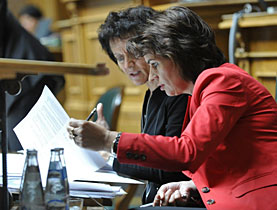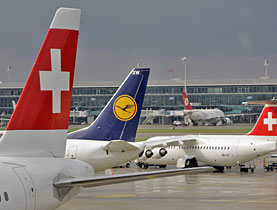EU policy hotly debated in parliament

The future of a crucial agreement with the European Union is the subject of heated debate in the Swiss parliament, with the two chambers divided in their opinion.
After six hours of discussion on Wednesday, the House of Representatives decided that a nationwide vote to be held on prolonging the agreement on the free movement of people should be separated from one on extending the right to the EU’s two newest members.
The House decision follows the line of the Swiss government. The other chamber, the Senate, wants to present the two issues to Swiss voters in a single package.
The EU and the Swiss government both want Bulgaria and Romania to enjoy the right of free movement, which allows EU and Swiss nationals to work in each other’s countries.
Should Swiss voters reject extending the right to these two countries, the so-called “guillotine” clause means that the entire package of bilateral agreements with the EU would be endangered.
Swiss Economics Minister Doris Leuthard described the existing agreement on free movement with the EU as a “success model for the economy and the labour market”.
Nationwide vote(s)
In 2009 Swiss voters are to decide whether the agreement should be prolonged. At the same time they are due to vote on whether the two new members should be included in the system.
The rightwing Swiss People’s Party is against extending the accord to Bulgaria and Romania, although it is in favour of continuing the existing agreement. It therefore wants the two issues to be put to two separate votes.
On the other hand, the centre-left Social Democratic Party, the Greens and the centre-right Christian Democrats want the agreement to be both continued and extended. They are in favour of combining the two proposals in a single vote.
The centre-right Radicals follow the Swiss government line, which favours both prolongation and extension, but wants the two issues to be voted on separately.
The House of Representatives – the larger chamber of the Swiss parliament – voted on Wednesday by 101 to 82 in favour of two separate votes. This means that the Senate, which in April voted in favour of linking the issues, has to reconsider its decision.
On Thursday the Senate Foreign Affairs Commission considered the matter, and confirmed its stand that the two issues should be put to voters as a package.
The House rejected proposals by the People’s Party to link any decision with the question of Switzerland’s tax disagreements with the EU. Swiss television broadcast the entire debate, which lasted for more than six hours.

More
Referendum
New markets
“Extension will open the door to 30 million new consumers. The growth of gross domestic product in the two countries is between five and six per cent. They are future markets for our exports,” said Social Democrat Evi Allemann during the debate.
Another Social Democrat, Hansjörg Fehr, warned that if extension was rejected, the entire package of bilateral agreements would become void, and everything would „collapse in ruins”.
At the same time Fehr called on the individual cantons – which are responsible for their own finance policies – to implement the accompanying measures on wage dumping properly.
“In that way we shall find more acceptance among the people,” he said.

More
EU bilateral accords
“Criminality and Immigration”
Radical Party member Christa Markwalder-Bär described free movement as a central pillar for prosperity and economic growth. “We would never accept it if the EU were to make a bilateral agreement with central Switzerland or the canton of Ticino. Neither Switzerland nor the EU can tolerate internal discrimination,” she said.
Foreign Minister Micheline Calmy-Rey described the extension of the agreement as a “logical consequence of our Europe policy”.
“Roma”, “criminality”, “illegal immigration” – those were the keywords that kept recurring in many People’s Party speeches. Some of them added that it was only a question of time before Serbia, Bosnia, Kosovo and later even Turkey join the EU, and then Switzerland would have to extend the right of free movement even further.
“We already have so many people from these countries living here, that this will create a huge pull effect,” said People’s Party representative Luzi Stamm.
A simple import
In fact, free movement is unnecessary, Stamm claimed. “For example, we could say: we’ll take an unlimited number of people from Germany in the next three or four years, and employers can simply import them when they want to.”
Leuthard recalled the discussions about the first agreement on the free movement of peoples a few years ago.
“At that time the word was: now cheap Portuguese labour is going to arrive. When it was extended [to the ten countries which joined in 2004] it was: cheap labour is going to come in from Poland.”
But the fact is that the people who came were “qualified or highly qualified”, the unemployment quota has fallen since free movement came into force, and there has been no evidence of a negative impact on wage levels, Leuthard pointed out.
swissinfo, based on an article in German by Andreas Keiser
According to a report by the State Secretariat for Economic Affairs (Seco), the free movement of people has given an impetus to the economy.
There has been no negative impact on wage levels or significant abuse of the social welfare system.
Unemployment has decreased significantly in response to the prevailing economic situation. There has been no evidence of EU citizens taking jobs away from Swiss workers, nor of wage dumping.
Seco head Jean Daniel Gerber believes free movement is Switzerland’s gateway to free and equal access to the EU area, something which is often forgotten.
Immigration from the EU is a result of the current economic situation and depends on companies’ needs for workers.
If economic circumstances change, or should there be a recession, fewer EU citizens would come to Switzerland.
The agreement on the free movement of peoples has been in force with the 15 “old” EU countries since June 1 2002.
In September 2005 Swiss voters agreed to extend the right to the ten countries which joined the EU in May 2004 (the Czech Republic, Cyprus, Estonia, Hungary, Latvia, Lithuania, Malta, Poland, Slovakia and Slovenia).
The agreement lasts until 2009. It will be prolonged automatically by the EU, but in Switzerland continuation is subject to a referendum.
At the same time as the agreement on free movement is prolonged, it is due to be extended to the two newest EU members, Bulgaria and Romania.

In compliance with the JTI standards
More: SWI swissinfo.ch certified by the Journalism Trust Initiative


You can find an overview of ongoing debates with our journalists here. Please join us!
If you want to start a conversation about a topic raised in this article or want to report factual errors, email us at english@swissinfo.ch.